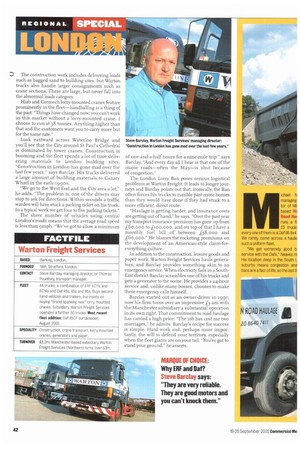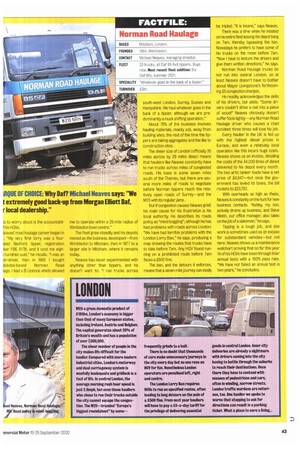ichael N managing tor of Mil based Pic Road Hal runs a fl 23 truckt
Page 42

Page 43

If you've noticed an error in this article please click here to report it so we can fix it.
every one of them is a Daf 85 8x4 We rarely came across a hauliE
such a uniform fleet.
"We get extremely good tl service with the Oafs," Neaves re His location deep in the South L suburbs means congestion and bans are a fact of life, so the last ti ts to vorr;.; about is toe accountabilf his HGVs.
Jeaves' road haulage career began in
"My very first lorry was a foureled Bedford tipper, registration ber FBE 817B, and it cost me eighi hundred quid," he recalls. "I was an er-driver, then in 1966 I bought ibledon-based Norman Road lage. I had a B Licence which allowed me to operate within a 25-mile radius of Wimbledon town centre."
The fleet grew steadily and his depots moved as the business developed—from Wimbledon to Mitcham, then in 1977 to a larger site in Mitcham. where it remains today.
Neaves has never experimented with anything other than tippers, and he doesn't want to: 'I run trucks across south-west London, Surrey, Sussex and Hampshire. We haul whatever goes in the back of a tipper, although we are predominantly a muck shifting operation."
About 75% of the business involves hauling materials, mainly soil, away from building sites: the rest of the time the tippers are taking aggregates and the like to construction sites.
The sheer size of London (officially 35 miles across by 29 miles deep) means that hauliers like Neaves constantly have to run trucks across miles of congested roads. His base is some seven miles south of the Thames. but there are several more miles of roads to negotiate before Norman tippers reach the relatively open roads of Surrey—and the M25 with its regular jams.
But if congestion causes Neaves grief, his main cause for his frustration is his local authority. He describes its roads policy as "mind boggling": although he has had problems with roads across London: "We have had terrible problems with the London Lorry Ban," he says, producing a map showing the routes that trucks have to take before 7am. Any HGV found running on a prohibited route before 7am faces a£500 fine.
The ban, and the detours it enforces, means that a seven-mile journey can easily
be tripled. "It is insane." says Neaves.
There was a time when he insisted on his entire fleet leaving The depot bang on 7am, thereby bypassing the ban. Nowadays he prefers tc have some of his trucks on the move before 7am. "Now I have to lecture the drivers and give them written directions," he says.
Norman Road Haulage trucks do not run into central London, so at least Neaves doesn't have to bother about Mayor Livingstone's forthcoming E5 congestion charges.
He readily acknowledges the skills of his drivers, but adds: "Some drivers couldn't drive a nail into a piece of wood!" Neaves obviously doesn't suffer fools lightly—any Norman Road Haulage driver who causes a road accident three times will lose his job.
Every haulier in the UK is fed up with the highest diesel prices in Europe, and even a relatively local operation like this incurs huge costs. Neaves shows us an invoice, detailing the costs of the 34,000 litres of diesel delivered to his depot every month. The two artic tanker loads have a net price of £4,647—but once the government has levied its taxes, the bill rockets to £23,762.
With overheads as high as these, Neaves is constantly on the hunt for new business contacts. "Ashley my son, actively drums up business, and Steve VVelch, our office manager, also takes on the job of a salesman,' he says.
Tipping is a tough job, and site work is sometimes used as an excuse for substandard vehicles—but not here. Neaves shows us a maintenance wallchart proving that so far this year 14 of his HGVs have been through their annual tests with a 100% pass rate. "We have not failed an annual test in two years," he concludes.
































































































































































